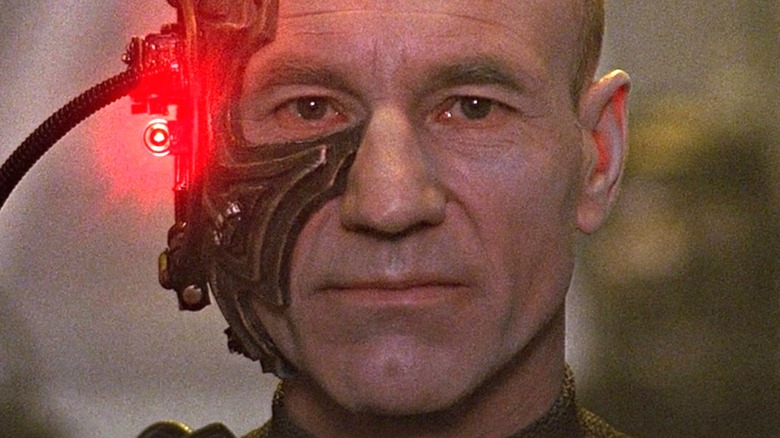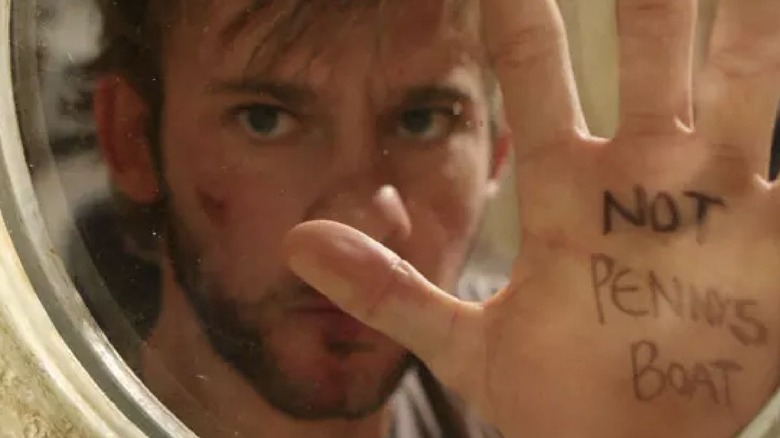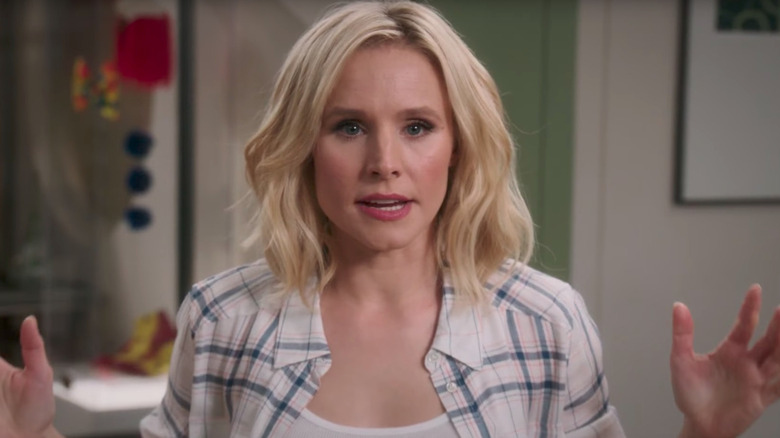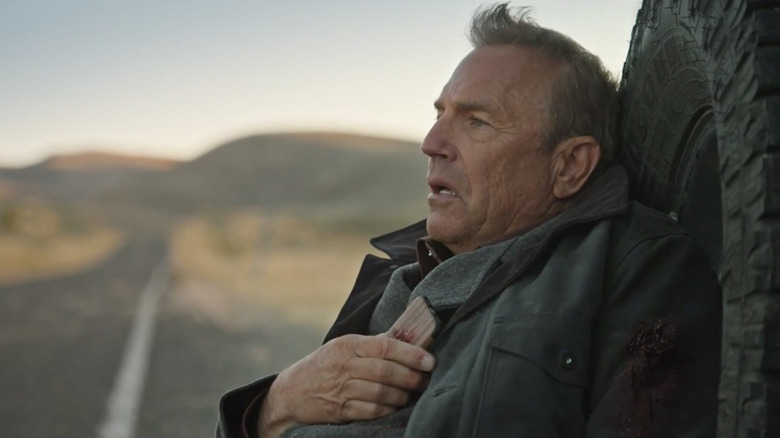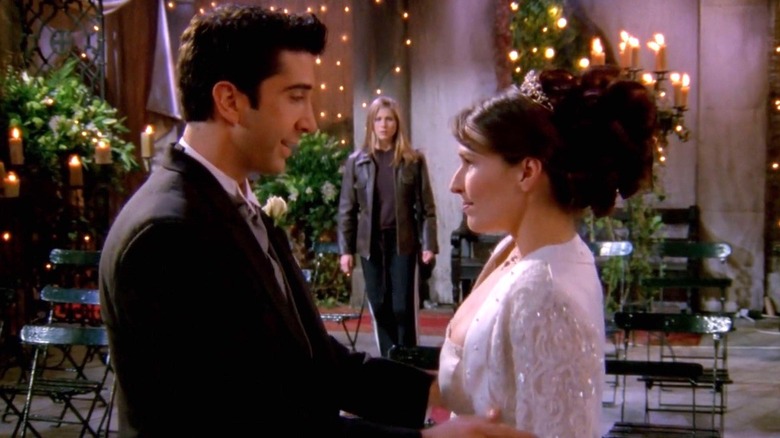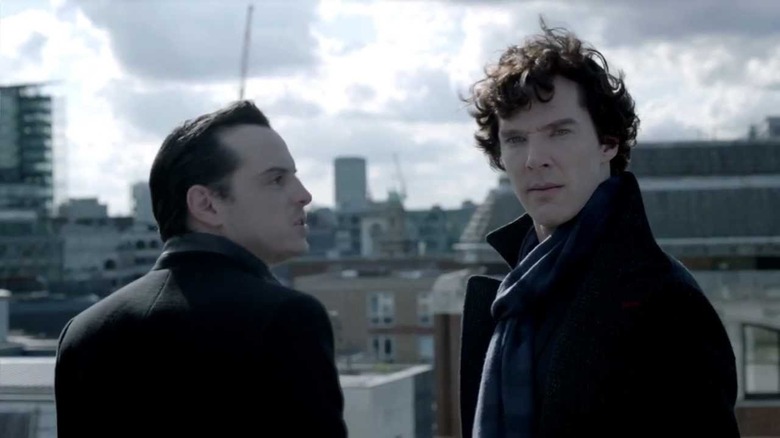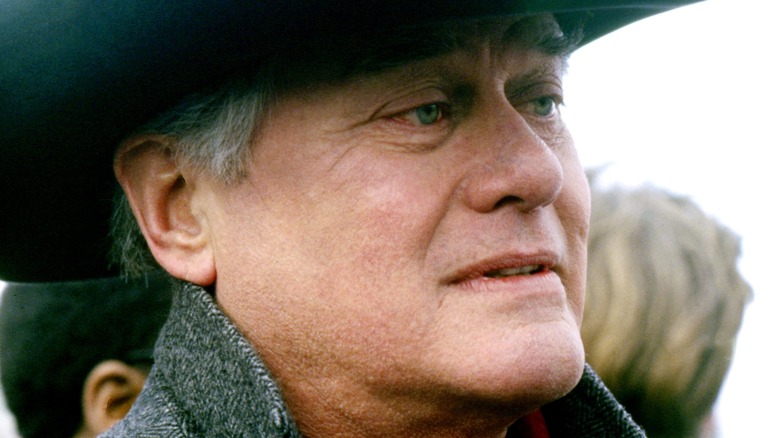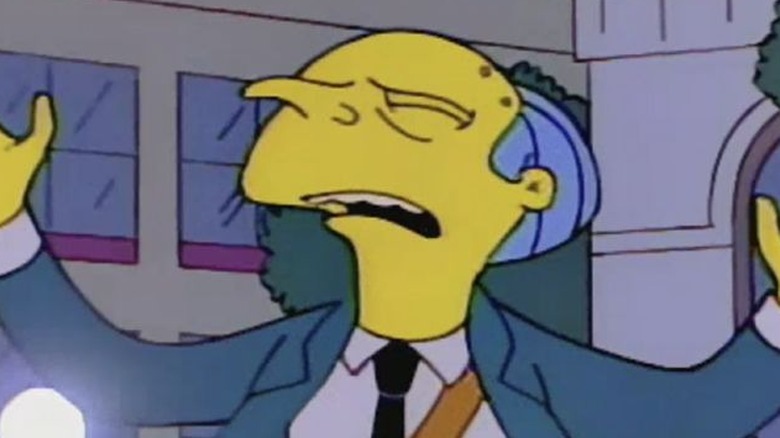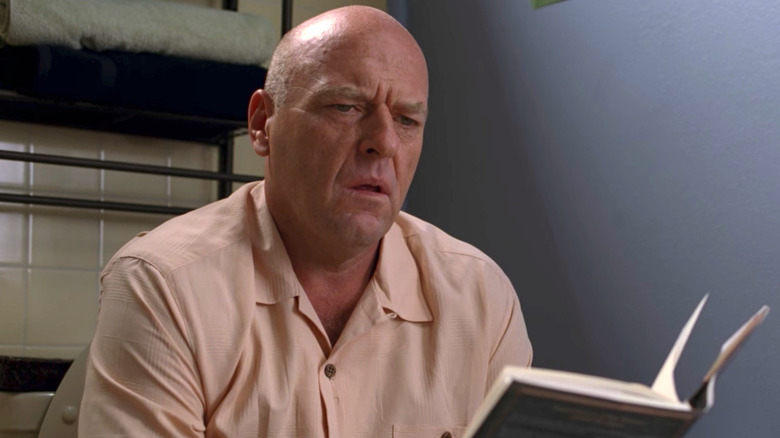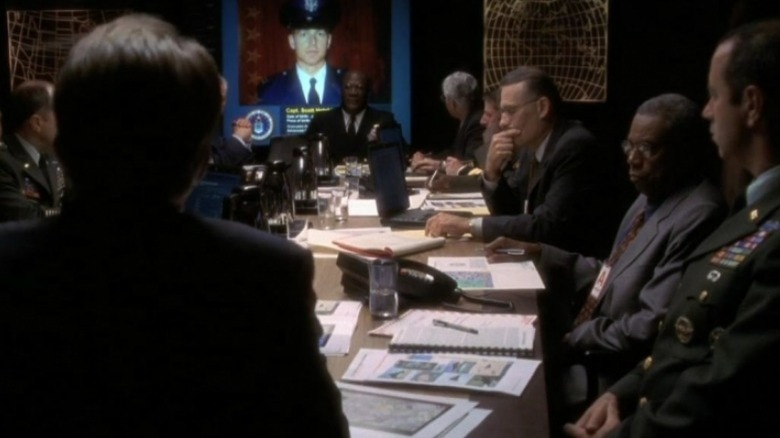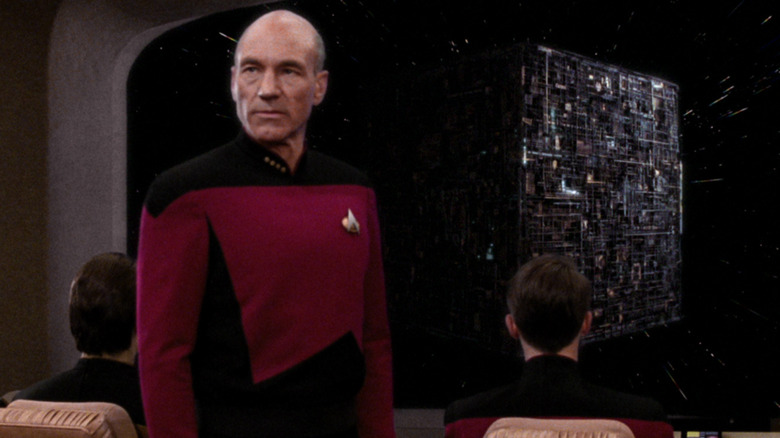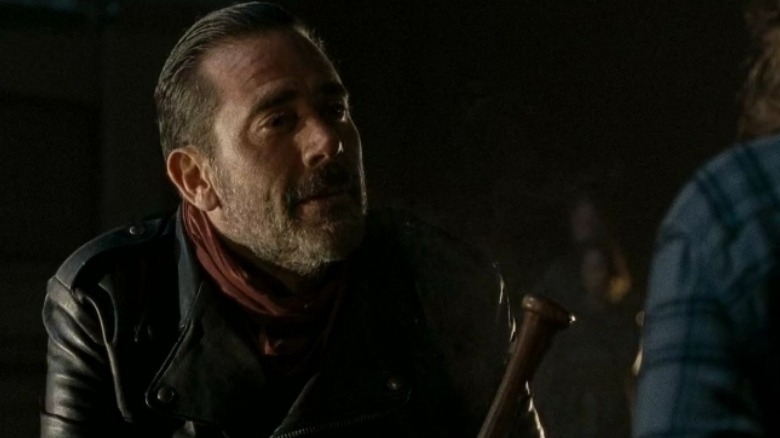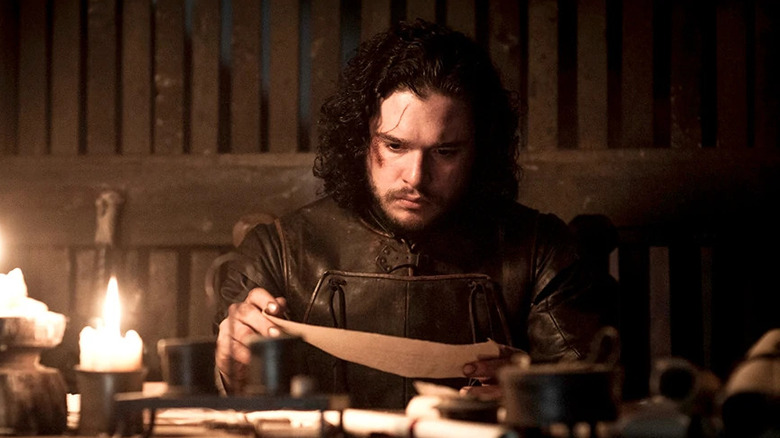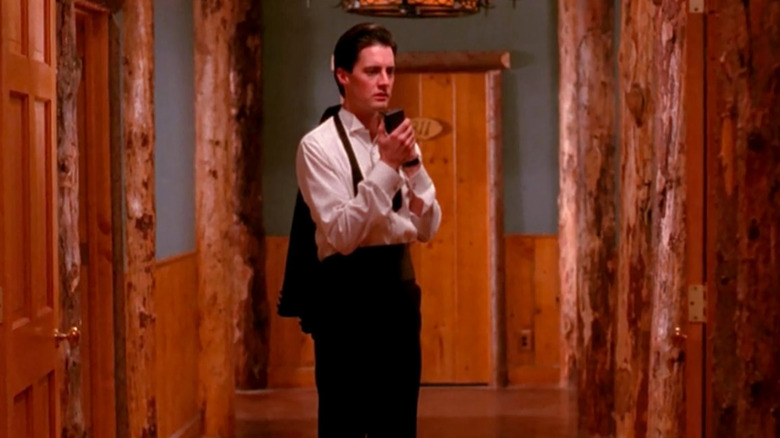The Greatest Season-Ending Cliffhangers In TV History
Audiences love a good story, and television is a unique medium for delivering ongoing adventures and serialized drama in ways not often found in movies. One of the best tactics TV uses to keep viewers riveted is the plot twist that leaves you hanging. Sometimes it comes at a commercial break, while other times it comes at the end of an episode, forcing you to wait a week until the next installment.
However, the best trick that TV producers have discovered to keep fans on the edge of their seats is, without a doubt, the season-ending cliffhanger. For decades networks seemed to fear the season-ending cliffhanger, afraid of viewers being turned off by missing a satisfying conclusion. Still, they became increasingly popular in the 1990s after a few hit shows proved that season-ending stories could leave audiences begging for more.
Many of these classic jaw-droppers have become some of the most famous episodes of television ever made, but which are the very best? Well settle in because we've got a list of the best season-ending cliffhangers in television history.
Lost (Season 3)
Like many shows featured on this list, the groundbreaking serialized drama "Lost" boasts a number of season-ending cliffhangers from its run that could have qualified. Still, the show, which set a new standard for prestige network television, had one cliffhanger episode that set itself head and shoulders above the rest — "Through the Looking Glass." A two-part season-ender for Season 3, the episode features everything that makes for a gut-wrenching cliffhanger: the death of a major character, the fate of others left unresolved, and multiple mysteries that leave fans screaming for answers.
A signature element of this J.J. Abrams series was its use of flashbacks to show where characters were before they crashed on the island where the show's primary adventures are set. However, beginning with "Through the Looking Glass," the producers switched up the formula to refresh the series with an unexpected flash-forwards that shows several survivors having somehow escaped the island. In the finale, we see Kate, Hurley, Sayid, and others resuming their lives and embroiled in new drama while Jack begs to return to the island.
Meanwhile, on the island in the present, a mission to find an underwater station has sealed Charlie's fate. His final message to Desmond — and the audience — is that the boat they thought was coming to rescue them is not what it seems. However, finding out what it really is would have to wait for Season 4.
The Good Place (Season 1)
The dark comedy "The Good Place," led by Ted Danson and Kristen Bell, was a surprise hit when it launched in 2016. It told the story of four strangers who meet in the afterlife where they are greeted by a deity named Michael who is there to help usher their transition into heaven. The Good Place is an idyllic, utopian village, but Eleanor quickly learns she is there by mistake and must ensure that nobody finds out she's really supposed to be in the Bad Place.
Perhaps not the kind of show you'd expect for a mind-blowing cliffhanger, series creator Michael Schur revealed in an interview with IGN that he actually consulted with "Lost" helmer Damon Lindelof as he wanted to pattern his series after the epic season finales and startling plot twists that the groundbreaking drama had made famous. With Lindelof's expert advice Schur succeeded in delivering a stunning final episode that set the stage for the remainder of the series.
After a full season of nothing going right for Eleanor, she faces the music after it's discovered that both Eleanor and Jianyu — real name Jason Mendoza — are supposed to be in the Bad Place. However, just as they are given a choice to decide on which two of the group will go down below, Eleanor has a revelatory moment of clarity: they're already in the Bad Place.
Yellowstone (Season 3)
In recent years, epic season-ending cliffhangers have become much more common, making them harder and harder to top. However, that doesn't mean showrunners have stopped trying, and in 2021, the crime drama "Yellowstone" proved you can still stun audiences with a shocking series finale. Set in the wilds of Montana, "Yellowstone" was a breath of fresh air for audiences, a neo-Western with a political twist centered on the powerful Dutton family whose land — the Yellowstone-Dutton Ranch — sits at the center of an epic power struggle between governments, businesses, and outlaws.
At the end of Season 3, conflicts with neighboring Broken Rock Indian Reservation, devious criminal empires, and rival politicians all come to a head when an unknown party orchestrates a daring assassination attempt on the entire Dutton family. Armed gunmen come for not just family patriarch John, but his son Kayce, his daughter Beth, and his daughter-in-law Monica, and nephew Tate.
Among the series' most nail-biting climaxes on this list, the Season 3 finale offered explosive action the likes of which the series had never seen and left several key cast members' fates uncertain. Still, the biggest mystery of all was who was behind the assassination attempts, and the answer was as surprising as the cliffhanger itself.
Friends (Season 4)
Quintessential '90s sitcom "Friends" needs no introduction, but it may surprise those unfamiliar with the series to learn that it also features one of television's best cliffhangers. Centered on one of the best-known "will-they-won't-they" couples ever, the episode addresses the on-again-off-again romance between Ross and Rachel, played by David Schwimmer and Jennifer Aniston. With the one-time lovebirds no longer together, Season 4 sees Ross become engaged to his new girlfriend, Emily.
In the Season 4 finale, "The One with Ross' Wedding," the big day has finally arrived, and it's a major TV event with a globe-trotting two-parter where the cast heads to London for the ceremony. Sarah Ferguson, Duchess of York, cameos as herself, while a parade of British stars pop up, including Hugh Laurie, Olivia Williams, Richard Branson, and June Whitfield. Still, the real surprise is Rachel, who decides that she still loves Ross and wants to stop him from saying his vows. Upon seeing how happy Ross appears to be while tying the knot, she decides to back away, crushing the hopes of fans everywhere that the pair might reunite.
The turnabout, however, occurs when Ross accidentally says Rachel's name up on the alter, leaving squeals of delight in the viewing audience and questions about what it means for Ross' marriage — not to mention for the future of the series.
Sherlock (Season 3)
For a time, the cliffhanger that capped off Season 3 of BBC's "Sherlock" became the most talked-about event in television. Debuting in 2010, the reimagining of the Arthur Conan Doyle classic was led by then-lesser-known British stars Benedict Cumberbatch and Martin Freeman. It quickly gained notoriety beyond the U.K. and soon became an international sensation.
By 2012 the series was as big as ever thanks to rave reviews and throughout Season 2 the specter of Sherlock Holmes' greatest nemesis, Moriarty, hangs over the story, culminating in a final confrontation on a London rooftop. With the lives of his friends in peril, Sherlock sacrifices himself to save his friends in a heartbreaking sequence that has to be seen to be believed. While the audience knows he survives thanks to a dramatic final shot, the world believes he's dead, and fans are left to wonder how on Earth he could have solved Moriarty's final problem while escaping certain death.
In the aftermath of the episodes airing, fan analysis of the episode went wild, changing the way in which viewers dissect their favorite shows (via The New Yorker). Fans worldwide took to Twitter and YouTube theories of how Sherlock could have possibly survived, and the fourth season conclusion even mocked fan response to the episode.
Dallas (Season 3)
Among the biggest shows of its era, "Dallas" was a prime-time soap opera led by Larry Hagman, Patrick Duffy, Victoria Principal, and Linda Gray. It ran for an incredible 12 seasons across three decades and chronicled the exploits of two rival Texas families, highlighting the scandals and murder that resulted in their struggle for power. However, it's perhaps best known for the single most iconic season-ending cliffhanger in television history, the third season finale "A House Divided."
The episode sees fan favorite J.R. Ewing become the target of an unseen shooter and left near death. Hospitalized and unable to finger the gunman, the big question on everybody's lips was "Who Shot J.R.?" — a phrase that eventually became synonymous with big TV stunts. A cultural touchstone in both prime-time viewing and television marketing, the episode drew the show's highest viewership to date as three-fourths of television sets in the nation tuned in to learn who pulled the trigger (via History).
Covered on the nightly news, major magazine covers, and beyond, you couldn't walk ten feet in the summer of 1980 without being reminded of the question on everyone's mind (via 80s Kids). As big as the cliffhanger was though, the conclusion was even bigger, and while the show may feel dated today, "Dallas" and its iconic cliffhanger remain a milestone moment in television.
The Simpsons (Season 4)
More than just an homage to the "Dallas" cliffhanger, "The Simpsons" Season 6 episode "Who Shot Mr. Burns?" also became a landmark television event. So hyped was the episode that Fox aired a prime-time special, "Springfield's Most Wanted" — hosted by John Walsh of "America's Most Wanted" — and ran a contest where fans could dial 1-800 number to guess who shot Mr. Burns (via Vulture).
In the episode, Mr. Burns becomes public enemy number one when he blocks out the sun in a money-making effort to charge more for his nuclear plant's precious power. Nearly everyone in town has a vendetta against him, making it nearly impossible to guess the culprit when an unseen assassin shoots him. To encourage viewers to figure out who did it, it was announced that there were plenty of clues planted in the episode that pointed to the killer, which helped make it one of the most-watched episodes ever of the series.
Coming at the height of the show's early popularity, the episode made audiences beg for the Season 7 follow-up, which was also smartly written and uproariously funny. That episode did more than parody "Dallas," as it including send-ups of famous sequences from movies like "The Fugitive" and "Basic Instinct." To this day, few family series have ever been able to equal the levels of excitement that surrounded "Who Shot Mr. Burns?"
Breaking Bad (Season 5)
"Breaking Bad" kept viewers on the edge of their seats for five astounding seasons. The series tells the story of high school chemistry teacher Walter White, in a career-defining role for Bryan Cranston, who is diagnosed with terminal cancer and turns to a life of crime to help pay his medical bills. Under the alias of Heisenberg, White quickly becomes a powerful drug lord who fights off enemies left and right, including DEA agent Hank Schrader — his brother-in-law.
Full of shocking twists and turns, the mid-season finale of the show's final year, "Gliding Over All," saw the biggest revelation yet. The episode's gasp-worthy ending found White's DEA agent brother-in-law finally putting all the pieces together and figuring out the truth: Walter White is Heisenberg. In classic "Breaking Bad" fashion, the climactic scene comes with a humorous twist, as his light bulb moment occurs while he's sitting on the toilet.
After years of coming close to being caught, the audience realizes that Walt's time may finally be up. Either that, or he'll be forced to kill his own family to keep his secret. Unfortunately, this is one wait that would drive fans mad, as it would be nearly a year before the second half of the show's final season gave fans a follow-up.
The West Wing (Season 1)
Launched in 1999, "The West Wing" was part of a new wave of revolutionary prestige television shows that included "The Sopranos" and "24" which featured serialized stories, big-name stars, and even bigger budgets. Created by Hollywood screenwriter Aaron Sorkin and starring Martin Sheen, "The West Wing" followed Jed Bartlet's turbulent tenure as the President of the United States. Quickly receiving rave reviews for its high drama and complex characters, its story escalated from compelling political drama to a nail-biting thriller Season 1's in a dramatic cliffhanger finale.
Like "Dallas" and "The Simpsons," the unresolved season-ender left audiences' mouths agape after an apparent assassination attempt on President Bartlett. Told mostly in flashback, the episode opens with Secret Service agent Toscano growing concerned as the president exits a public appearance. The bulk of the drama shows Bartlett preparing for his upcoming town hall earlier that day while juggling an international crisis. However, just when the episode comes to its close, shots ring out.
In the confusion, the audience has no idea who fired or was hit, leaving it wide open for a dramatic conclusion, possible plot twists, and plenty of fan theorizing. Would Sheen be exiting the series after its first season, with Vice President Hoynes stepping into the lead role? All options were on the table, and the dramatic cliffhanger was just one of many elements that helped turn Season 2 into a runaway success (via The New York Times).
Star Trek: The Next Generation (Season 3)
In 1990, season-ending cliffhangers were still a relative rarity in the industry, but the sci-fi spin-off series "Star Trek: The Next Generation" changed all that with a landmark episode that capped off the series' third season. Often credited as the year the show came into its own after a pair of rocky early seasons, the cliffhanger put the crew of the Enterprise in serious peril by telling a story bigger than anything fans had seen before and arguably bolder than even the feature films seen to that point.
The action begins with the Borg attempting a takeover of the Federation. After being confronted by the Enterprise, Captain Picard is taken captive and — in a stunning turn of events — is transformed into a Borg, announcing himself on-screen as their new leader Locutus in the episode's final moments. Commander Riker has a devastating weapon that could wipe out the Borg ship, but firing it would mean killing Picard. In one of the show's most famous moments, Riker orders Worf to open fire, only to cut to black, with "To Be Continued" flashing across the screen.
Left to ponder what might happen next, viewers in the pre-internet era could easily have believed that star Patrick Stewart might not return to the series, especially considering the show had already unexpectedly killed off a prominent cast member in its short run. However, millions of viewers would have to wait three excruciatingly long months to find out.
The Walking Dead (Season 6)
Set in a zombie apocalypse, "The Walking Dead" follows a band of survivors as they struggle against hordes of undead. However, in Season 6 the mindless flesh-eaters are the least of their worries, as their biggest enemies prove to be vicious tyrants and greedy opportunists who represent mankind's worst instincts. From a twisted local warlord to a band of bloodthirsty cannibals, former sheriff Rick Grimes leads his group against one villain after another.
However, the worst yet is the ruthless Negan, the most diabolical and psychopathic adversary Rick and company have faced. Leader of a group who calls themselves the Saviors, his ominous and imposing presence is felt throughout the second half of Season 6, and though he is never seen, it's clear he is a man not to be trifled with. It's not until the devastating season finale, "The Last Day on Earth," that we finally meet him in the flesh.
When he finally steps on screen, it's a terrifying moment that sends shivers down your spine. With several of our heroes lined up for punishment, Negan wields a barbed wire-wrapped baseball bat and promises death to one of them. He picks his target and savagely beats them to death in one of the most violent scenes in the series — but audiences would have to wait until Season 7 to find out who the victim was.
Game of Thrones (Season 5)
With the success of high fantasy on the big screen in the 2000s, HBO did the unthinkable by bringing it to television with the groundbreaking drama "Game of Thrones," based on a series of books by George R.R. Martin. With Shakespearean levels of drama and intrigue, combined with Tolkien-esque world-building and cutting-edge visual effects audiences had never seen on the small screen, the series was an overnight sensation, and its season-ending jaw-droppers were a big part of what kept fans tuning in.
The biggest may have been the Season 5 finale, "Mother's Mercy." A series known for being unafraid to kill off even its most central characters, the series surely had fans bracing themselves for the expected season-ending stunner. While readers of the books may have seen it coming, few others could have anticipated the shocking death of the series' most beloved character — Jon Snow.
Even those who had read the books were wondering whether he was gone for good, as the series had already begun departing from the novel's plot, and anything could happen. Though he would indeed be resurrected almost immediately in Season 6's second episode, his death was devastating, and fans of the series had to wait nearly a year to see it all play out.
Twin Peaks (Season 1)
When it comes to television there are few shows that can lay claim to terms like "landmark" and "unprecedented" the way that David Lynch's "Twin Peaks" can. Debuting in 1990, it was unlike anything audiences had ever seen, and critics and viewers alike could barely even characterize it. It was part crime drama, part surrealist dreamscape, and part avant-garde thriller. At the center of its weirdness was the brutal murder of a young woman, Laura Palmer, and the FBI agent assigned to find the killer, Dale Cooper.
Filled with borderline incomprehensible imagery, an oddball cast of characters, and a complex plot that strained credulity, viewers were left struggling to figure out what it all meant. Still, interpreting the story was a big part of the appeal, and through the show's first season, there were far more questions than answers, making it a frustrating mystery for many. However, in the first year finale, "The Last Evening," multiple plots running through the series come to a climax, with plenty of surprises for audiences to gasp at and more than one storyline left dangling.
The heart-stopping final scene left audiences angry to be waiting all summer for a conclusion, as FBI agent Cooper and his fate is left unresolved.
